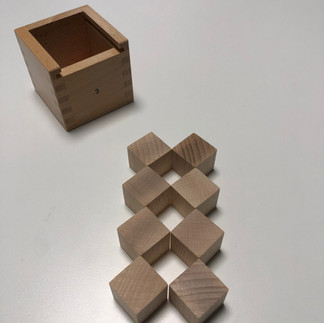Fröbel's Gifts | 25th May 2022
- Tam Dibley
- May 24, 2022
- 2 min read
Updated: Jun 10, 2022
On the 25th of May 2022, a small group met to discuss the educational philosophy of Friedrich Fröbel, whilst also having the chance to play with a series of his 'gifts' -- physical toys, in this case sets of wooden blocks, designed for children between the ages of two and four. We used gifts 3-6, all of which come arranged as a cube which breaks down into increasingly complex sets, based on the divisibility of the cube.

Fröbel is best known as the inventor of the kindergarten, an early years educational system which centres on play. His philosophy of education connects this play with various spheres of thought that the world of a learner opens onto. Fröbel specifically identified Forms of Knowledge (abstract or mathematical relations between shapes), Forms of Life (existing or possible real-world objects) and Forms of Beauty (usually planar configurations of shape with a focus on symmetry and pattern) as three directions for thought or types of object that can be engaged with through the use of his gifts. Our discussion and play through this session led us to explore the possibilities and limits of these categories and the potential for others, through a key article by George Stiny (1980). These three ways of using the gifts are able to provide useful distinctions, without overly prescribing what is to be done with the blocks or exhausting all possibilities.
The way the gifts are presented also plays an important role in Fröbel's philosophy. The four gifts we explored all came packaged in a cubic wooden box, designed to be presented to a young child as a whole, who would then unpackage them and see their original configuration as part of the cube before dismantling and disassembling this into smaller pieces. These pieces would then be used to build new forms which unify the blocks in other ways. After finishing play with the cubes, the idea is they are repacked into the cube in their original configuration, again reinforcing this relation. This particular way of interacting with the blocks was, according to Fröbel, a way for the child to gain a sense of the relation between the whole and parts of the gift leading to a more general sense of this relation. Froebel connected these ideas to his theological beliefs and their connection to the forms of nature.

The session was open and active, with participants putting forward thoughts as they arose. A key point which became a focus of the discussion was the types of thought and learning which might be connected with very young children. The terms 'Presentiment', 'Surmise' and 'Premonition' are all those which Fröbel himself used to describe childrens' thought, and all refer to thinking which is holistic and difficult to verbalise, as opposed to specific and categorical.
The session was designed partly as an introductory session for a project which will explore the gifts as a pedagogical tool by both running sessions in which children and adults play with them, as well as designing and prototyping other sets of objects inspired by the gifts. Our play through the session, and the approach to learning with them through suggesting 'forms' were both helpful in directing thoughts for the project.







































Comments